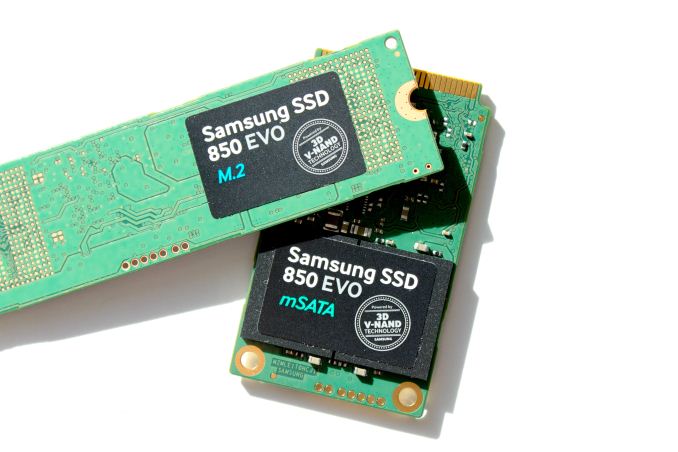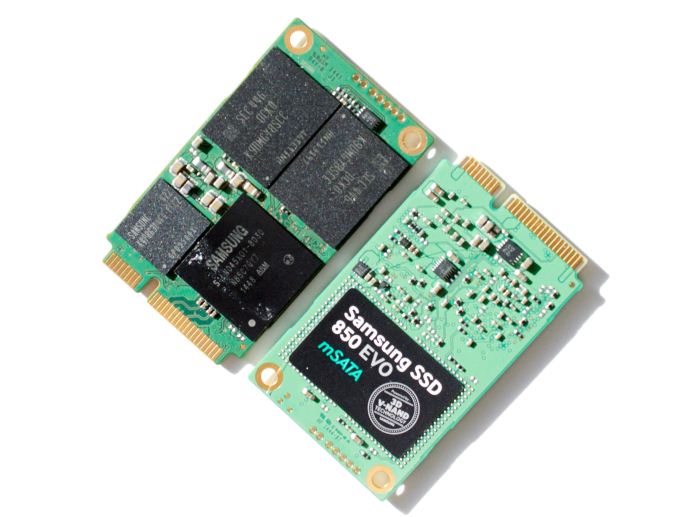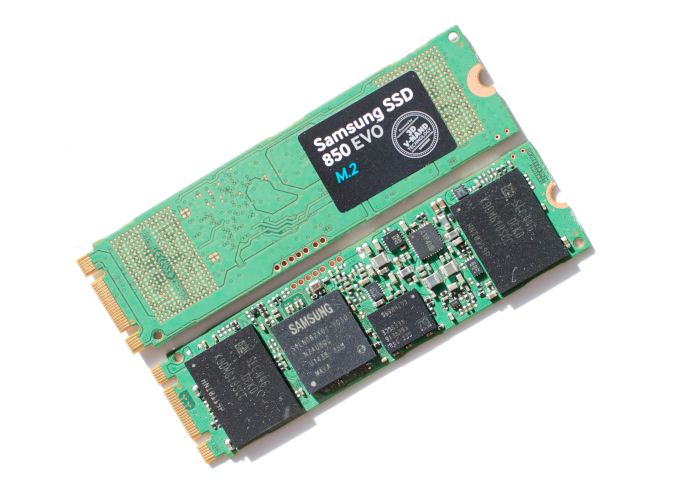The Samsung SSD 850 EVO mSATA/M.2 Review
by Kristian Vättö on March 31, 2015 10:00 AM EST
Four months ago Samsung introduced the world to TLC V-NAND in the form of SSD 850 EVO. It did well in our tests and showed that 3D NAND technology essentially brings TLC NAND to the level where planar MLC NAND stands today. The initial launch only included the most popular form factor in 2.5", but did not address the upgrade market where mSATA and M.2 are constantly growing in popularity. With today's release, Samsung is expanding the 850 EVO lineup with M.2 and mSATA models.
The move isn't really surprising because Samsung released an mSATA version of the SSD 840 EVO a bit over a year ago and when the 850 EVO was originally launched we were told that mSATA and M.2 models would follow later. The addition of M.2 is new to Samsung's retail lineup, but it makes a lot of sense given that many PC OEMs have switched from mSATA to M.2, and ultimately M.2 will be replacing mSATA in full.
Architecturally the mSATA and M.2 models are not any different from their 2.5" sibling. The heart of the drives is still Samsung's own MGX controller (excluding the 1TB model, which is powered by the older MEX controller) and the NAND is 32-layer 128Gbit TLC (3-bit per cell) V-NAND that is manufactured using 40nm lithography. TurboWrite (Samsung's pseudo-SLC caching) is also included and the cache sizes have remained unchanged from the 2.5" model. DevSleep and TCG Opal 2.0 (eDrive) are both supported too and endurance comes in at a respectable 75TB for 120GB/250GB and 150TB for 500GB/1TB models.
Given the similarity with the 2.5" model, I strongly suggest that you read our 850 EVO review for a full scope of TurboWrite, TLC V-NAND and other tidbits as I won't be covering those in detail in this review.
| Samsung SSD 850 EVO mSATA Specifications | |||||
| Capacity | 120GB | 250GB | 500GB | 1TB | |
| Form Factor | mSATA | ||||
| Controller | Samsung MGX | Samsung MEX | |||
| NAND | Samsung 40nm 128Gbit TLC V-NAND | ||||
| DRAM (LPDDR2) | 512MB | 1GB | |||
| Sequential Read | 540MB/s | 540MB/s | 540MB/s | 540MB/s | |
| Sequential Write | 520MB/s | 520MB/s | 520MB/s | 520MB/s | |
| 4KB Random Read (QD1) | 10K IOPS | 10K IOPS | 10K IOPS | 10K IOPS | |
| 4KB Random Read (QD32) | 95K IOPS | 97K IOPS | 97K IOPS | 97K IOPS | |
| 4KB Random Read (QD1) | 40K IOPS | 40K IOPS | 40K IOPS | 40K IOPS | |
| 4KB Random Write (QD32) | 88K IOPS | 88K IOPS | 88K IOPS | 88K IOPS | |
| Steady-State 4KB Random Write Performance | 3.1K IOPS | 4.9K IOPS | 6.8K IOPS | 9.7K IOPS | |
| DevSleep Power Consumption | 2mW | 2mW | 2mW | 4mW | |
| Slumber Power Consumption | 50mW | ||||
| Active Power Consumption (Read/Write) | Max 3.5W / 4.3W | ||||
| Encryption | AES-256, TCG Opal 2.0, IEEE-1667 (eDrive) | ||||
| Endurance | 75TB (41GB/day) | 150TB (82GB/day) | |||
| Warranty | Five years | ||||
Like its predecessor, the 850 EVO mSATA offers capacity of up to 1TB, which still remains the highest capacity mSATA drive in the industry. Samsung has a substantial lead in its NAND packaging technology because currently no-one else is shipping 16-die packages in high volume and by comparison Samsung has been doing this for quite some time now. I've heard Toshiba has some 16-die packages available, but the yields are very low and pricing comes in at about a dollar per gigabyte, whereas other packages are priced at ~30 cents per gigabyte. Micron also has 16-die packages on paper, but I've yet to see them used in any actual products.
| Samsung SSD 850 EVO M.2 Specifications | ||||
| Capacity | 120GB | 250GB | 500GB | |
| Form Factor | M.2 2280 (single-sided; SATA 6Gbps) | |||
| Controller | Samsung MGX | |||
| NAND | Samsung 40nm 128Gbit TLC V-NAND | |||
| DRAM (LPDDR2) | 512MB | |||
| Sequential Read | 540MB/s | 540MB/s | 540MB/s | |
| Sequential Write | 500MB/s | 500MB/s | 500MB/s | |
| 4KB Random Read (QD1) | 10K IOPS | 10K IOPS | 10K IOPS | |
| 4KB Random Read (QD32) | 97K IOPS | 97K IOPS | 97K IOPS | |
| 4KB Random Write (QD1) | 40K IOPS | 40K IOPS | 40K IOPS | |
| 4KB Random Write (QD32) | 89K IOPS | 89K IOPS | 89K IOPS | |
| Steady-State 4KB Random Write Performance | 2.8K IOPS | 4.1K IOPS | 5.8K IOPS | |
| DevSleep Power Consumption | 2mW | 2mW | 2mW | |
| Slumber Power Consumption | 50mW | |||
| Active Power Consumption (Read/Write) | Max 2.4W / 3.5W | |||
| Encryption | AES-256, TCG Opal 2.0, IEEE-1667 (eDrive) | |||
| Endurance | 75TB (41GB/day) | 150TB (82GB/day) | ||
| Warranty | Five years | |||
Unfortunately the M.2 version tops out at 500GB. The reason lies in the fact that the M.2 is a single-sided design, which only has room for two NAND packages. There are quite a few laptops that use the single-sided M.2 2280 form factor as it allows for thinner designs, but I still would have liked to see a 1TB double-sided version. It is worth noting that while both PCIe and SATA based devices can have M.2 form factors, Samsung is only releasing the 850 EVO M.2 in the SATA format at this time.
With a 128Gbit die and sixteen die per package, the maximum capacity for each package comes in at 256GiB, yielding a raw NAND capacity of 512GiB, of which 500GB is usable in the 850 EVO.
| AnandTech 2015 SSD Test System | |
| CPU | Intel Core i7-4770K running at 3.5GHz (Turbo & EIST enabled, C-states disabled) |
| Motherboard | ASUS Z97 Deluxe (BIOS 2205) |
| Chipset | Intel Z97 |
| Chipset Drivers | Intel 10.0.24+ Intel RST 13.2.4.1000 |
| Memory | Corsair Vengeance DDR3-1866 2x8GB (9-10-9-27 2T) |
| Graphics | Intel HD Graphics 4600 |
| Graphics Drivers | 15.33.8.64.3345 |
| Desktop Resolution | 1920 x 1080 |
| OS | Windows 8.1 x64 |
- Thanks to Intel for the Core i7-4770K CPU
- Thanks to ASUS for the Z97 Deluxe motherboard
- Thanks to Corsair for the Vengeance 16GB DDR3-1866 DRAM kit, RM750 power supply, Hydro H60 CPU cooler and Carbide 330R case












58 Comments
View All Comments
Laststop311 - Wednesday, April 1, 2015 - link
Was really disappointed with the 1TB results. Also disappointed no ultra m2 interface. I wont be upgrading until I can get a pci-e 3.0 x4 interface on the drive. The samsung sm951 is where its at.Laststop311 - Wednesday, April 1, 2015 - link
Really annoying that I dont see this drive for sale anywhere and it's been talked about for a loooong timeKristian Vättö - Wednesday, April 1, 2015 - link
RamCity just got its first SM951 batch, so it's now available for purchase.https://www.ramcity.com.au/upgrade/data-storage/in...
bricko - Thursday, April 2, 2015 - link
Is the 951 NVMe - How to they compare to the new Intel 750 series which are PCIe gen 3 and NVMeseen here
http://linustechtips.com/main/topic/340041-intel-l...
http://forums.overclockers.co.uk/showthread.php?p=...
Intel are launching the new 750 Series range of SSD's these are PCI-E 3.0 versions with 4 lanes and are NVMe based SSD's
goodyes - Wednesday, April 1, 2015 - link
Ya, but results that I have a 1TB 840 msata and write sequential at more than 500MBps around 520max MBps, and now I see than new 850 msata tops at ?? 480MBps ?? cannot be possible what my eyes look, AND WHY THE HELL NO ONE REVIEWER COMPARE With olders 840 msata, so I must think that all of you guys are a paid reviewers and you get money from samsung, if not, YOU MUST compare to older modelKenPC - Wednesday, April 1, 2015 - link
I am seriously concerned that the 840 evo, and TLC in general may indeed have an uncurable problem with slowdown after a period of time. This same problem has also been reported in multiple instances for Samsung OEM drives based on the 840 evo TLC technology.GIven that the 850 evo msata line was delayed by Samsung by about a month, it might be possible that the Anandtech review units were actually tested in late Feb and the go-ahead to publish the results only recently provided.
I did also notice that the estimated 'March" timeframe for a new 840 evo firmware has come and passed, as well as no drive magician support for the 850 evo m2/msata drives yet.
Anandtech results for the 1TB 850 evo unit are also quite concerning.
So, I also join the crowd asking for a look at the 850 evo 2.5 and msata drives after some time has passed to see if they suffer from the slowdown problem too.
And a rhetorical, but serious question - does anybody actually have a Samsung TLC drive that has NOT suffered from the slowdown as measured by the proper tools a few months after the drive was formatted/set up?
And kudos to Anandtech - for an SSD review that really tests the drives, not just a run of ATTO or such.
Per Hansson - Wednesday, April 1, 2015 - link
"anything that taxes the drive a bit more may run into the issue, which is basically that the drive stops for up to dozens of seconds (i.e. your system freezes). Until Samsung fixes that, I would advise against buying the 1TB version unless you have a very light workload (web browsing, email, etc.). I suspect it's fixable through a firmware update, but I'll have to wait for Samsung's reply to be sure of that."A wise man once said: if you wait for a firmware fix for your Samsung SSD's you will wait a long time.
He died of old age.
RIP Samsung 840 TLC drives.
Dzungpv - Friday, April 3, 2015 - link
Missing Temperature when idle, full load or stretch, i want this information before buy them .szhosain - Sunday, April 5, 2015 - link
As far as I can tell, you only tested the M.2 version of the Samsung 850 EVO in a 500GB size.Can we assume that the MSATA version of that drive and size will perform essentially identically?
voicequal - Monday, April 13, 2015 - link
Good catch on the poor mSATA 1TB performance during the performance consistency test. It harkens back to the early Jmicron stuttering days. I was similarly affected by the SanDisk U100 a few years ago. The system freezes, particularly when swap file is active, and disk throughput drops to low single digit MB/s. Hard to believe the most modern SSDs can still get into this state. Vanilla benchmarks don't show the problem.